Slavonski Brod Ranks Third Worst City in Europe on Air Quality Index
ZAGREB, 17 June 2021 - The eastern Croatian city of Slavonski Brod is the third worst city for the quality of air according to the European Environment Agency (EEA) data which indicates that more than half of European cities still have polluted air despite reduced emissions during the pandemic lockdown.
The worst situation is in eastern Europe where coal continues to be the main source of energy.
The most polluted air was registered in Nowy Sacz in Poland where the biannual average of fine particulate matter on an area of fewer than 2.5 micrometers (PM2.5), which are considered to be damaging to health, amounted to 27.3 micrograms per cubic meter.
Cremone in Italy ranked second with 25.9 micrograms PM2.5 per cubic meter and Slavonski Brod ranked third with 25.7 micrograms PM2.5 per cubic meter.
Three cities with the cleanest air in Europe were Umea in Sweden (3.7), Tampere in Finland (3.8), and Funchal in Portugal (4.,2).
Poor air in Zagreb too
This year's PM2.5 average in Zagreb amounted to 15.8 micrograms per cubic meter which means the air is of poor quality and presents a moderate health risk. In Rijeka, it was 10.6, which is moderate pollution, according to EEA.
EEA analyzed data for 323 European cities in 2019 and 2020 and determined that only 127 had a PM2.5 level below the limits recommended by the World Health Organisation (WHO).
Exposure to fine particulate matter cause more than 400,000 premature deaths per annum in Europe.
The EEA data indicates that the biannual average is only available for those cities that are regularly monitored and do not include all European cities.
EEA notes that the lockdown due to the pandemic resulted in a decrease in the level of nitrogen dioxide released from diesel motors but the level of particulate matter remained high.
The level of nitrogen dioxide fell by 60% in some cities due to the lockdown in April 2020 while the reduction in the particulate matter was less dramatic - with the level of coarse particulate matter (PM10) falling between 20% and 30% in April 2020.
Even though the quality of air improved significantly last year, air pollution remains to be stubbornly high in many cities in Europe, EEA Executive Director Hans Bruyninckx said.
For the latest news about Zagreb, click here.
World Environment Day Dedicated to Ecosystem Restoration
ZAGREB, 5 June 2021 - World Environment Day is observed on 5 June and this year it is dedicated to the restoration of ecosystems, whose resources are the foundation of the social and economic progress of humankind as well as people's health and wellbeing, Croatia's Economy and Sustainable Development Ministry has said.
Ecosystems play a significant role in the prevention of health crises such as COVID-19 because by destroying natural ecosystems, people have significantly increased the risk of illnesses passing from animals to people.
The ministry says the necessity to protect nature and the environment is also reflected in the fact that, according to the World Economic Forum, half the global GDP ($40 trillion), depends moderately or strongly on nature.
Given that many ecosystems have been irreversibly destroyed and others considerably degraded, our survival depends on the speed of action and clear international community coordination for their preservation and renewal, the ministry says.
Therefore the United Nations Environment Programme, first with a resolution on 1 May and then with the Decade on Ecosystem Restoration movement, which symbolically kicks off with this year's World Environment Day, has called on all governments, the business sector, the expert and scientific community, and the wider public to prevent further degradation of ecosystems and to ensure a future for the generations to come, the ministry says.
That's why it's necessary to raise public awareness of the fact that humankind spends by the middle of the year the Earth's capacities that should suffice all year, it adds.
Ecosystem restoration, together with transition to a circular economy and a climate-neutral society, can simultaneously prevent poverty, hunger, loss of biodiversity, climate change, and uncertain access to drinking water, the ministry says.
The director of Greenpeace Croatia, Zoran Tomić, has told Hina that it's important to make cities greener and enable them to really recover.
City and local authorities now have the opportunity and duty to launch ecological transition to alleviate the effects of climate change and health crises, he says.
WWF Adria has called on citizens to demand of the authorities to implement concrete nature protection measures and support, through various campaigns, all those who contribute to nature preservation and protection.
Animal Friends Croatia has announced that on the occasion of World Environment Day, it will send all Croatian MPs a brochure on food and the ecology to explain the link between breeding animals for food and world hunger, global warming, water consumption and deforestation.
For more about ecology and environment in Croatia, follow TCN's dedicated page.
Saturday Volunteering with Beer: Active Weekends in Split
June 5, 2021 - Volunteers picked up garbage and cleaned the green territory in Split and Solin on two sunny Saturdays. The active weekends in Split were organised by the Association 'Sunce' and Zagrebačka pivovara d.o.o. One TCN intern reports from the field.
An action in Solin became a part of a socially responsible campaign ‘Čuvaj, pazi, ne bacaj!’ (Take care, take caution, don't throw!) initiated by Zagrebačka pivovara. The idea was to clean 15 illegal dumps throughout the country. With the support of local partners - ecologically conscious local associations and clubs - it started on 12 May in Osijek and finishes today in Solin. In Split, the association 'Sunce' that protects nature and the environment was featured as a partner of the campaign.
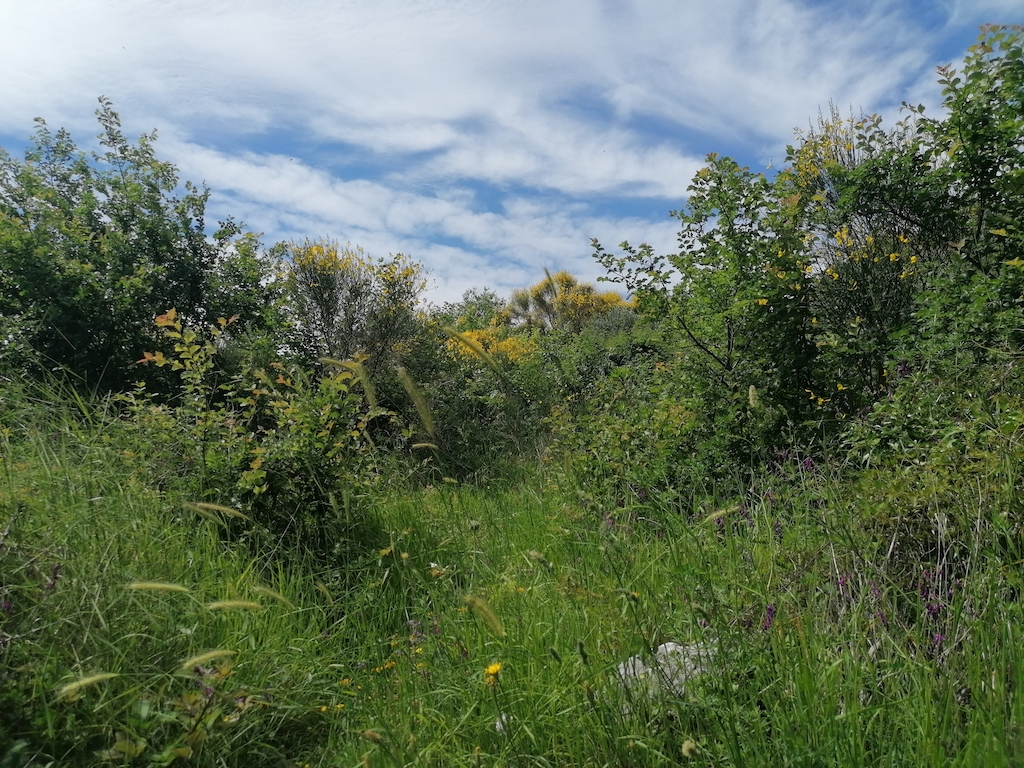
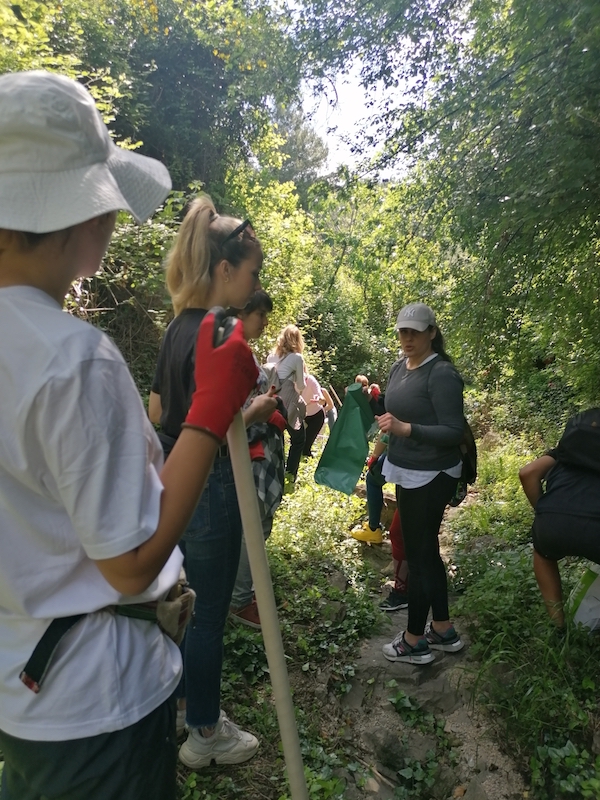
I was invited to participate in the cleaning action by my friend from 'Sunce', then I invited my colleague from the Split scout association. In fact, I was waiting for my friends from Zagreb to come to Split for a weekend, as I got an invitation. My friends were going to relax in sunny Split - for one of them it was supposed to come to Dalmatia for the first time - and I was thinking about an easy beach & bar program for them. But then I decided that Saturday cleaning in the suburbs would be a nice beginning of the weekend. Actually, it shows that our lovely Split is not only a tourist spot to chill, it's a city that cares about the ecology and provides an enabling environment for living.
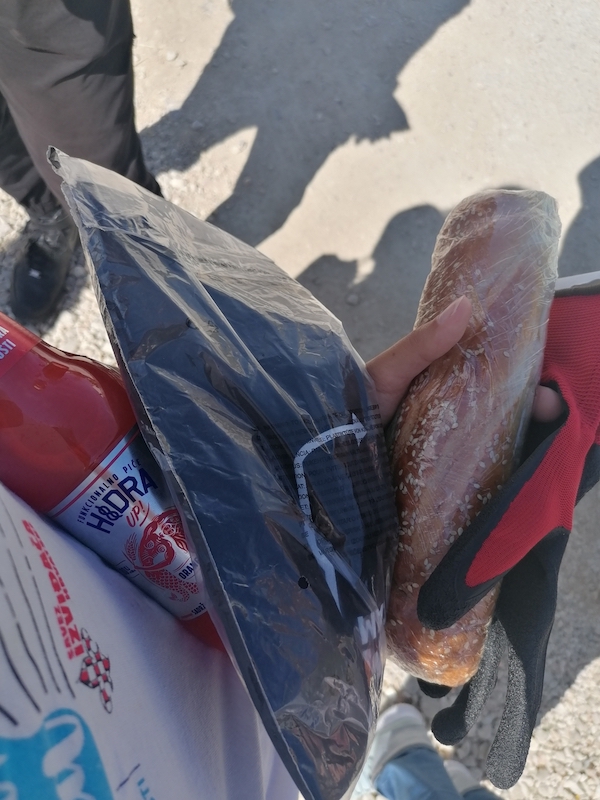
We met with 'Sunce' staff at 09:00 am and came to the garbage dump in Solin at 09:30. Offhand, half of the volunteers came from Split and a half from Solin. Among volunteers, there were local people from the Split neighborhoods as well as expats from North Macedonia, Russia, Italy, and Germany. Some staff of the Zagrebačka pivovara office located in Dugopolje joined us too. In sum, we were around 25 people on the first Saturday, 22 May, and around 10 people on the second Saturday, 29 May. Therefore, the first Saturday team handled all the garbage in a little over two hours, while the second team used all the time allotted (4 h).
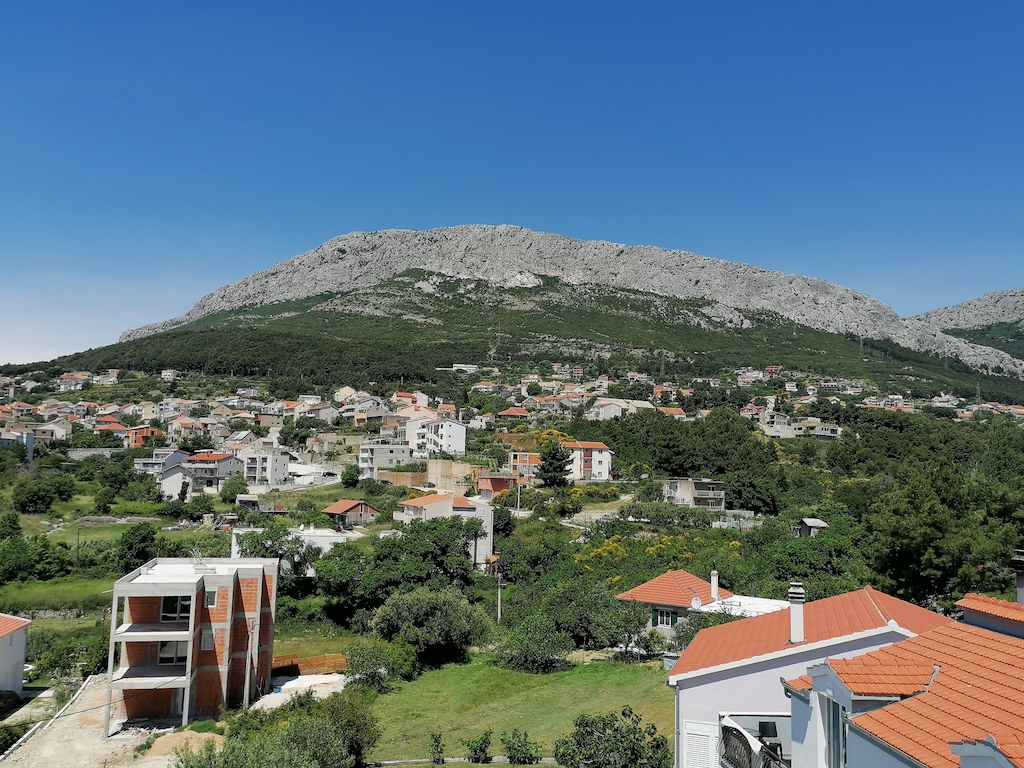
Zagrebačka pivovara provided us with cleaning tools, protective gloves, corporate identity t-shirts, and some snacks and non-alcohol drinks at the beginning. Within two hours we collected about 30 large garbage bags. By the way, we have learned that it's easier to clean dense clusters of garbage, probably, typical weekend grill places, than garbage disseminated along the road. My first finding was a funny child's toy. The second finding was a thrown can of Ožujsko pivo. My friends competed to find the oldest soda can or bottle. If I'm not mistaken, a Coke from1993 won this competition.
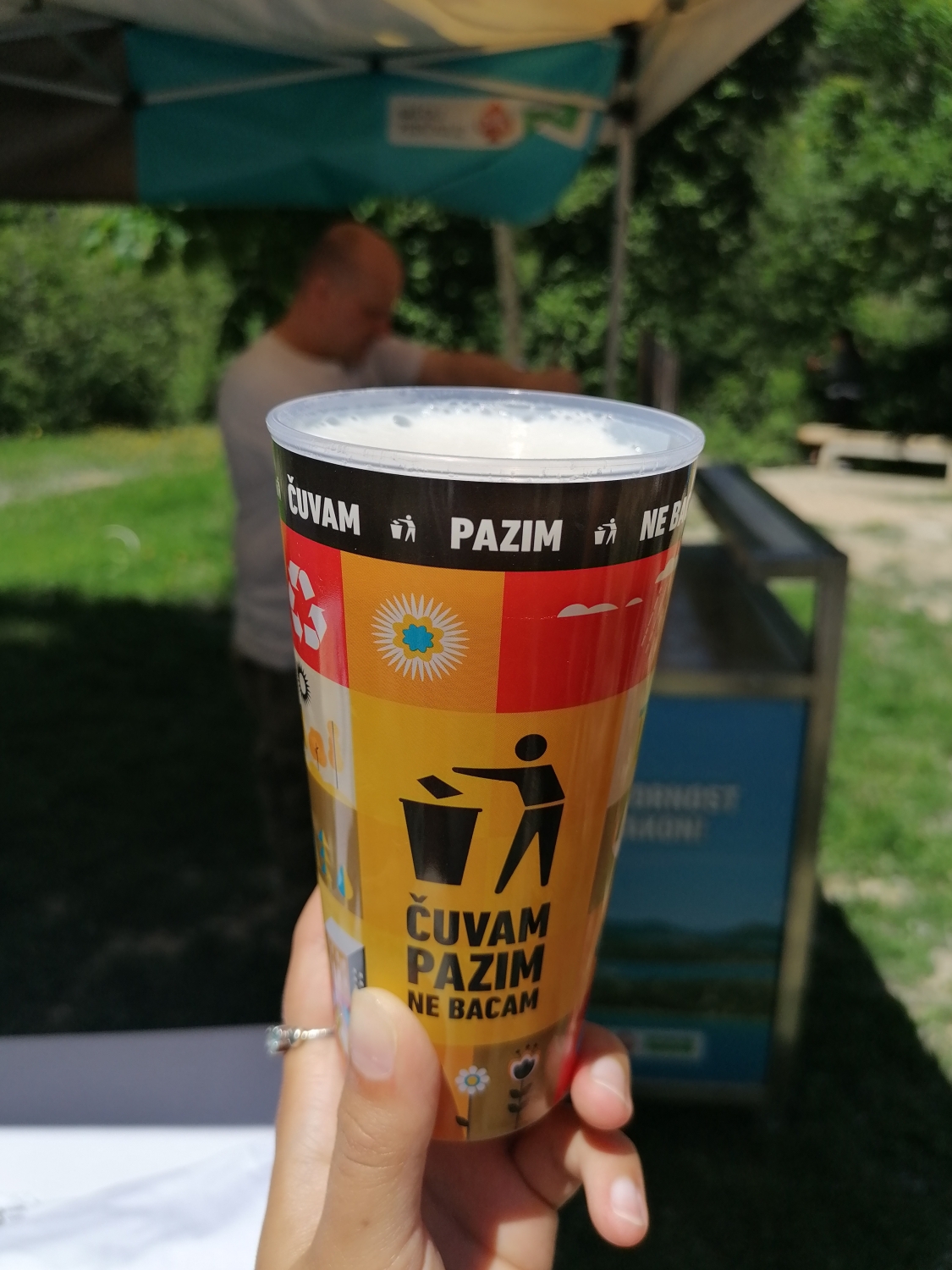
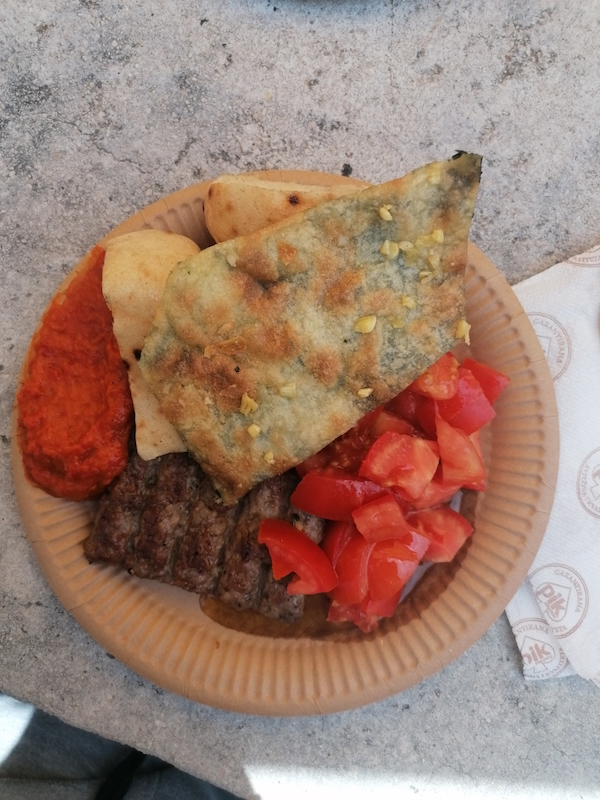
With all the garbage bags filled, we created a live chain and put it together on the side of the road from where it will be taken for disposal. I really enjoyed the atmosphere of solidarity and cooperation in our chain speaking in Croatian, Russian and German simultaneously. Upon cleaning, we moved to a beautiful nature place in Solin - Odmorište uz rijeku Jadro (Rest area along the Jadro river). There, Zagrebačka pivovara offered us a grill and beers in the fresh air. It was a good reward for good work and a great chance to get to know the people you're volunteering with.
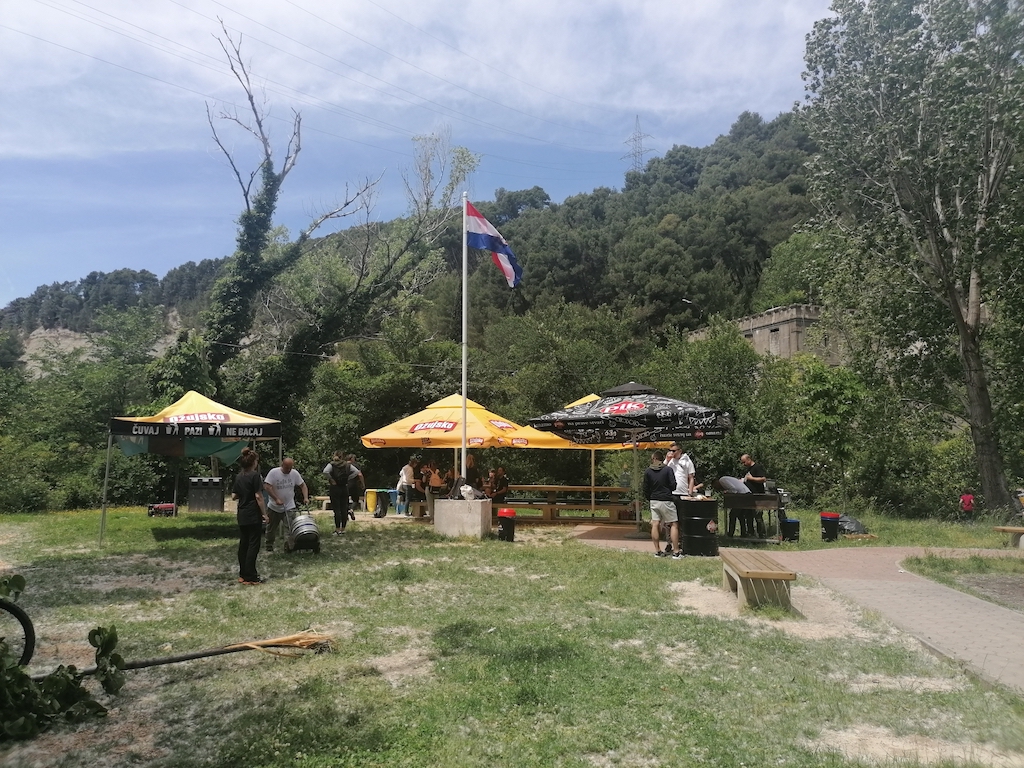
For more, follow our lifestyle section.
Green Activists, Some Opposition MPs Slam Low Carbon Transition Strategy
ZAGREB, 21 May 2021 - Several activists of the Green Action gathered outside the national parliament on Friday to express their dissatisfaction with the strategy for low carbon development, which was presented to lawmakers on Friday morning.
The document which was today on the parliament's agenda has neither vision nor ambition. We consider it a failure, said the Green Action NGO leader Luka Tomac.
Tomac said that the scientific community had been warning for 20 years that Croatia had 10 years to make a turnaround in its climate policy, however, the document showed that the government was not inclined to make such plans and postponed the climate action for the period after 2030.
Activist Marija Mileta said that the strategy envisaged investments, import, and further development of fossil fuels even until 2050.
Opposition lawmakers say the document is outdated
During the parliamentary debate on the document, lawmakers from the Opposition parties said that the strategy was outdated.
Some said that the strategy lacked the courage to make headway.
For more about politics in Croatia, follow TCN's dedicated page.
Rovinj Sea Research Centre Celebrating 130 Years of Work
May 18, 2021 - The Rovinj Sea Research Centre turns 130 in 2021. It is the place in Croatia for oceanographic research and all things science related to the preservation of the sea and maritime life.
Established back in 1891 as Berlin's Aquarium Zoological Station, the research Institute is known today as the Rovinj Sea Research Centre (CIM), and last week it celebrated 130 years of work. An affiliate of the Ruđer Bošković Science Institute (IRB), that institute recently reported that CIM currently has 54 employees working in four laboratories, and the centre is heavily involved in numerous impressive scientific projects.
''This includes five projects of the Croatian Science Foundation (HrZZ), worth 5,855 635 HRK, three projects financed within the INTERREG cross border programme (worth 1,326 000 euros), three projects with European structural and investment funds (7,189 531 HRK), and two projects financed within the EU programme for research and innovations, OBZOR 2020, valued at 179,360 euros,“ says the IRB official website.
The section of the IRB page dedicated to CIM adds that the centre offers a multidisciplinary take on the research of the sea, offering both basic and applicable oceanographic research. This includes six areas of interest: processes and dynamics in the food chain, examining the dynamics of water masses, ecology (species and the interrelations of species in both clean and in polluted waters), sea organism research (ecological, physiological, and genetic features of organisms, and a pollution effects study), the monitoring of pollution and sea quality, and finally, the monitoring of eutrophication (a process in which the environment becomes enriched with nutrients which can trigger the development of algae and cause an imbalance in the ecosystem).
Set in the beautiful town of Rovinj on the Istrian peninsula because of the clear waters of the Adriatic sea, CIM is on a mission to preserve marine life and its biodiversity.
CIM truly has a rich tradition, having conducted international systematic research and monitoring of the marine ecosystem of the Northern Adriatic for over 30 years. ''This approach became a model for the regional organisation of the European systematic monitoring of the coastal sea,'' says IRB.
IRB adds that in this long tradition, the Croatian science programme of monitoring the Northern Adriatic played a huge role. Having begun fifty years ago, it developed into the Jadran Project, making Croatia one of the first countries in all of Europe to have developed a systematic approach to the monitoring of the sea.
''Additional confirmation of the tradition and scientific quality of CIM can also be seen in the recent joining of CIM to JERICO – the Joint European Research Infrastructure network for Coastal Observatory, making CIM a partner of some of the most famous European Institutes“, concluded the IRB's explanation.
Learn more about Beaches in Croatia on our TC page.
For more about science in Croatia, follow TCN's dedicated page.
Miroslav Škoro Vows to Close Down Jakuševec Landfill if Elected Mayor
ZAGREB, 8 April, 2021 - Homeland Movement leader Miroslav Škoro said on Thursday that if elected Mayor of Zagreb, he would deal with the problem of the city's Jakuševec landfill and close it down.
"We should do all we can to ensure that the residents in this part of Zagreb no longer have to live near a landfill with an unpleasant smell in the air," Škoro said in Jakuševec.
He said that about 110,000 tonnes of biodegradable waste is disposed of in Jakuševec annually, including 60,000 tonnes of household waste that produces an unpleasant smell in the air. "There is no need for that," he added.
Škoro said that Zagreb had such potential for compost production that it could earn HRK 35 million from it annually. He also warned that Zagreb spent HRK 25 million on disposal of plastic waste, while with proper management it could earn HRK 100 million from it.
For more about politics in Croatia, follow TCN's dedicated page.
Green Phone Network Receives 2,500 Croatian Calls About Environmental Problems in 2020
ZAGREB, 6 March, 2021 - In the last year, the Green Phone Network received about 2,500 calls from Croatian citizens about environmental issues in the country, and most of those reports referred to waste.
Every citizen of the Republic of Croatia may report an environmental problem or request information on the number 072 123 456, the network which includes nine environmentalist associations, says on its web site.
One in four calls about inappropriate waste disposal
In 2020, most of the calls were warnings about the inappropriate waste disposal (every one in four calls), while class about construction detrimental to the environment made up 10.89% of those 2,500 calls.
Citizens complained about a poor air quality (10.41%) and about damage done to the greenery (9.61%).
Also some of the calls were about noise, traffic, environmental issues concerning forests, soil and animals.
After the establishment of the first Green Phone in 1992, other associations decided to launch the same service.
Thus in September 1999, with the financial support of USAID (United States Agency for International Development), Green Phone networks were established by seven associations for environmental protection: Zelena Akcija from Zagreb, Eko Pan from Karlovac, Environmental Society Žmergo from Opatija, Zelena Istra from Pula, Sunce from Split, Kap Života from Gospić, and the Society for the Protection of Nature og Slavonija i Baranja from Osijek.
In 2003, within the project "Strengthening the Green Phone Network", financed by the European Commission, five other environmental organisations joined the Network, and one in 2007. One member left the Network in 2010, so it now comprises nine associations: Zelena Akcija from Zagreb, Eko Pan from Karlovac, Environmental Society Žmergo from Opatija, Zelena Istra from Pula, Sunce from Split, ZEO Nobilis from Čakovec, Zeleni Osijek from Osijek, Eko Zadar from Zadar, and Krka from Knin.
The aim of the Green Phone is to encourage citizens to actively participate in environmental protection and to encourage the competent institutions to solve environmental problems more efficiently.
Greenpeace Activists Plant Trees in Downtown Zagreb
ZAGREB, 5 March, 2021 - Greenpeace activists planted ten trees in Zagreb's Martićeva Street on Friday in cooperation with the 1POSTOZAGRAD initiative to encourage local government to plant more trees and to point to the importance of green areas.
The activists brought a three-metre tree prop with the message "Three, four, now!" whereby Greenpeace joined a collective tree-planting week.
They also presented a new Greenpeace initiative called #ZazeleniGrad (For a green city), which focuses on green areas and supports civic initiatives fighting for the preservation of existing and creation of new ones, just as 1POSTOZAGRAD (1 percent for the city) is doing.
"Our cities, including Zagreb, lack greenery. This has become especially evident in the current circumstances, when we feel a stronger need to stay outdoors and in nature. We wish to encourage a stronger development of the so-called green infrastructure, which contributes to biodiversity, reduces the effect of urban heat islands, ensures shade, reduces stress and generally improves people's psychophysical condition," said Ivan Gregov, leader of the #ZazeleniGrad campaign.
The local elections in May will be an opportunity to prioritise green areas in cities, he added.
Circular Economy on Islands Lags Due to Low Environmental Awareness
February 17, 2021 – In a video podcast entitled "Energy Transition on the Islands," organized by the Island Movement initiative, participants warned that underdeveloped environmental awareness is one of the main obstacles to implementing the circular economy on islands.
As Hina reports, the deputy mayors of Hvar and Cres warned that citizens are still unaware of the green economy's importance, which makes it challenging to introduce a circular economy on islands.
"The most difficult phase in achieving sustainable development is to explain to ordinary citizens why the energy transition would be a step forward," said Marin Gregorović, deputy mayor of Cres.
The circular economy is a production and consumption model that encourages sharing, borrowing, reuse, repair, recovering, and recycling of products and materials to achieve the product's added value. Such a concept has a positive effect on reducing the amount of waste.
Commenting on the inefficient disposal of waste on the islands, Gregorović noted that "the system is not working well" and that "we have not yet reached the stage of resolving the issue of biowaste disposal."
"Although we have a recycling yard and dual waste management on Cres, and we plan to build a composting plant, the story of the circular economy is still just – a story," said Gregorović.
Kuzman Novak, deputy mayor of Hvar town, added that "the fundamental problem at the national level is waste management."
"We take the garbage bags out of the house, and they are taken away, which we don't see, so we don't think they are our concern anymore. That is the key problem," Novak said, explaining the underdeveloped environmental awareness of citizens.
"When we talk about sustainable development, it's not just about solar power plants and waste management, it's essentially developing an awareness not to be selfish," said Novak.
The new EU Action Plan for the Circular Economy is one of the key elements in achieving climate neutrality, which is a central goal of the European Green Plan. Voting on the new EU circular economy action plan, the European Parliament this month called for additional measures to achieve a carbon-neutral, environmentally sustainable, and fully circular economy by 2050.
To read more about lifestyle in Croatia, follow TCN's dedicated page.
Rijeka Environmental Group Installs Sea 'Trash Can' At Croatian Port
The first Seabin device, a floating “trash can” and seawater filter, was installed on Friday in the passenger port of Rijeka.
Rijeka Based Initiative S.E.A. Donated Seabin Device
The Rijeka-based Initiative S.E.A. (Save, Embrace, Achieve) donated the Seabin device to the Port Authority of Rijeka to raise awareness about the need to protect and conserve the marine environment. The initiative also introduces sustainable solutions for the use and management of marine life as one of its most valuable resources.
Seabin is a floating trash can which constantly filters seawater, collecting plastics, microplastics, detergents, oils and other materials from the surface, preventing them from drifting off to the open sea and harming marine flora and fauna, according to Morski HR on February 10, 2020.
“The initiative was founded to primarily to raise awareness about the need to change environmental attitudes, especially in our oceans, and to foster further debate on the ‘green transition’ which is beginning to take hold in response to the global environmental crisis. The focus of the initiative is to dispose of plastics and micro plastics. It also promotes implementing the most advanced green methods, practices and technologies for better environmental management and utilization of its resources,” they explained.
Seabin Acts as Floating ‘Trash Can’ in Marinas, Yacht Clubs, Ports
According to their website, the Seabin V5 unit is a ‘trash skimmer’ designed to be installed in water at marinas, yacht clubs, ports and any body of water with a calm environment and available suitable services.
The unit acts as a floating trash can which skims the water surface by pumping water into the device. The Seabin V5 can intercept floating debris, macro and micro plastics and microfibers with an additional filter. By acting as a trash skimmer, the Seabin V5 is also able to clean the water from contaminated organic material including leaves and seaweed.
The Seabin V5 can be equipped with oil absorbent pads that absorb petroleum-based surface oils and detergent which is predominant in most marinas worldwide.
Surface Water Passes Through Catch Bag At 25,000 Liters Per Hour
Water is sucked in from the surface where it passes through a catch bag inside Seabin. The device is equipped with submersible water pump capable of displacing 25,000 liters per hour and can be plugged directly into either a 110V or 220V outlet. The water is then pumped back into the marina leaving litter and debris trapped in the catch bag.
The Seabin V5 can catch an estimated 3.9 kilograms of floating debris per day or 1.4 tons per year (depending on weather and debris volumes) including micro plastics as small as 2 millimeters.
Follow our Lifestyle page for more information on environmental initiatives in Croatia. More information about the Seabin V5 can be found on their website and Facebook page.


